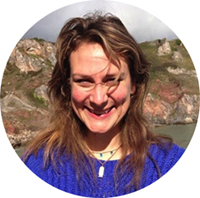My dad was Northumbrian and we spent a lot of time in that county, eventually moving there. My family seemed to know a lot of naturalists who also played music. I worked as a conservation warden for the Northumbrian Wildlife Trust for years – charting bird numbers and weather data, welcoming visitors to hides and watching the sea and the shore.
When touring Britain, I’m constantly reminded that there is always something magical to observe, even in a motorway jam: swifts, ever-changing wildflowers on the verge, red kites expanding across the country’s skies…
I’m often driving around with Martin Simpson, who has an incredible knowledge of nature, and we stop occasionally to look at water voles or meadowsweet or a bit of canal… it’s heaven. Travel shapes your understanding of Britain’s dimensions: once we drove all day without leaving Lincolnshire.
The most beautiful sight in Britain is the sea and if I were a British wild animal, I’d be a seal. I’ve always loved seals – as a child I was obsessed by the grey seals around the Farne Islands – and I love to swim, in almost all seasons when I was younger. I love folklore myths about selkies and mermaids.
My solo album Sweet Visitor was partly a reaction to moving to the inner city after living on a narrowboat for 12 years, and has a lot of content about the relationship between urban and rural spaces. My new album with Martin Simpson and Andy Cutting, Murmurs, has a strong wildlife/conservation thread running through it. I’m writing currently for Sweet Liberties, a project celebrating parliamentary democracy and human rights, with songs concerned with hunting, land ownership and how our treatment of nature reflects our humanity.
I can’t go far with small children and a heavy work schedule, so I rely on my city garden for space and thinking time. It’s not huge but it seems miraculous after life on a boat – we have a few veggies, heaps of wildflowers, herbs and a lawn that’s mostly clover. Last year we had two swarms of bees visit us from the hives in the nearby cemetery and I wrote "Dark Honey" about them, which is on Murmurs. I write many of my songs there.
My favourite memory of the British countryside is seeing two otters crossing a country lane while driving with my husband James at twilight.
The worst thing I’ve experienced in the great outdoors in Britain is falling into a canal off my boat, while mooring on a relatively quiet and deep stretch on my own, and not being able to get out. I startled some passers-by when I popped my head up over the edge and asked for help. This didn’t only happen once.
Many British residents have a sense of both urban and rural life, as well as a close relationship with the liminal spaces between countryside and city: the sort of edgelands Rob Cowen celebrates in his book Common Ground (see page 97). People talk about my hometown (Sheffield) as being an industrial centre with direct access to beautiful wilderness, but it’s also a city with a stark divide between rich and poor. So you can be relatively close to rural beauty without sensing it at all – while being trapped by poverty and circumstance. I’m sure that occurs in reverse as well.
My rural hero is traditional singer Joseph Taylor (1833-1910), from Saxby All Saints in North Lincolnshire. He was a farm bailiff and had the most incredible lilting voice. His songs, exemplified by the raw and bloody "Rufford Park Poachers", are slices of rural struggle, survival and expression at the turn of the century.
I was very young when I first read Watership Down by Richard Adams, and for me it perfectly conveys the fragility and cruelty of nature as well as being an astoundingly complex illustration of how folklore, languages and societies work.

